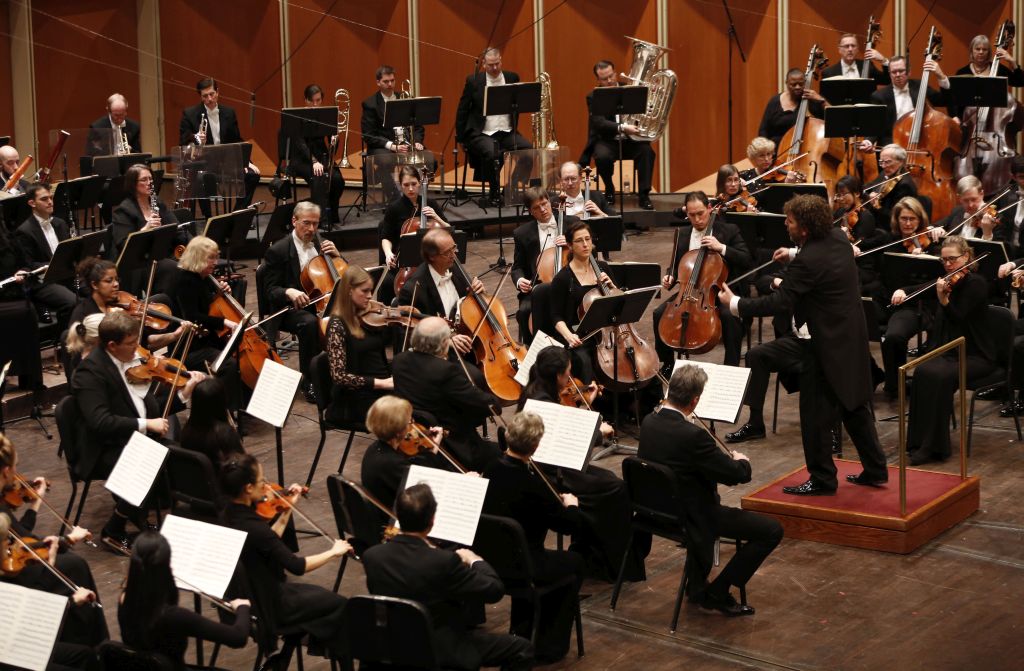Symphony Celebrates Bernstein’s Legacy
Season celebrates Lennie, opening concert offers big program of varied music.
The Milwaukee Symphony opens its season on Friday with performances of works by Beethoven, Bernstein, Heggie, and Clyne. Next year marks the 100th anniversary of Leonard Bernstein’s birth, and the MSO is devoting its entire season to a Bernstein festival that not only includes music by the legendary composer and conductor, but also includes American music that he championed.
The opening weekend program features guest conductor Cristian Măcelaru, Conductor-in-Residence of the Philadelphia Orchestra and Music Director of the Cabrillo Festival in Santa Cruz. An accomplished violinist and composer as well as a conductor, Măcelaru is winner of the 2014 Solti Conducting Award.
Beethoven called the Symphony No. 7 in A major “one of my best works.” It was premiered in Vienna with Beethoven conducting on December 8, 1813 at a benefit concert for soldiers wounded at the Battle of Hanau. The symphony celebrates the defeat of Napoleon Bonaparte’s army by Austrian and Bavarian troops just outside of Frankfurt. An emotional audience was reported to be “ecstatic” about the performance and repeat concerts were scheduled immediately. The famous second movement in A minor with its insistent rhythm quickly became a favorite and throughout the nineteenth century was often performed on its own.
Beethoven’s Seventh Symphony was the last piece that Leonard Bernstein conducted before his death on October 14, 1990. Ill from chronic emphysema, Bernstein lead the Boston Symphony Orchestra in a performance at Tanglewood in August.
Dennis Najoom, co-principal trumpet emeritus of the MSO, was at that final concert. He remembers a rainy and cold evening, Bernstein stepping out to conduct the second half of the program in a white jacket. “As the symphony went on he dropped his left arm and his right arm was crunched up.” He stopped conducting sometimes. The symphony became slower and slower. “We almost didn’t listen to the orchestra. All eyes were on him,” Najoom recalls.
“I’m sure it was a very emotional thing for the orchestra. You could see him failing.”
A fitting tribute and opening to the season is the overture to Candide. Bernstein began working on the comic operetta in January 1954, in the midst of the McCarthy era. Collaborating with the playwright Lillian Hellman, Bernstein was reacting to the artistic constrictions of Cold War society. Hellman and Aaron Copland had been called before the House Un-American Activities Committee, and the three were listed in a secret FBI file of 15,000 “presumed saboteurs.” Accordingly, Bernstein called Candide an indictment of “puritanical snobbery, phony moralism, inquisitional attacks on the individual, brave-new-world optimism, [and] essential superiority.” Real satire wasn’t possible in the 1950s, Bernstein wrote. In a characteristically dramatic comment, he asserted that the arts were “whiling away the time until the world gets better or blown up.”
The bright melodies and circus band sounds mask a dark tale based on Voltaire’s 1759 satire. Candide is a student of the Optimist Dr. Pangloss, based on the German philosopher Gottfried Wilhelm Leibniz. Leibniz argued that, since God created the world and God is perfect, we live in the best of all possible worlds, a phrase that Bernstein picked up for the opera. Bad things happen to young Candide, but Pangloss’s optimism rationalizes hate, bigotry, wars, and natural disasters as inevitable.
Bernstein’s opera was a flop, but has been revised, recorded, and restaged several times since its opening in October 1956, and has a wonderful score.
Philosophically, Melville’s magnum opus Moby-Dick fits well with Candide. Melville intended his 1851 novel to satirize American Transcendentalist philosophy as egotistic and irresponsible. It is a tale of obsession and the pursuit of a dream. Captain Ahab, hailing from the Quaker settlement of Nantuckett, pursues the great whale, part chimera, part symbol of American greed. Ahab is driven, obsessive, “stricken and blasted” in the words of Gene Scheer’s libretto to Jake Heggie’s opera. Whereas the novel’s 206,052 words contain meditations on slavery, race, imperialism, and the business of whaling, Heggie and Scheer’s opera pares the story down to the action aboard the whaling ship Pequod. The libretto is character-driven, exploring the cost of obsession, and the music sets the mood, becoming both “wildly atmospheric” as it depicts storms and waves, and “tender” in moments when the crew shares their reflections on the life at sea. Heggie’s work does not disguise its debt to the great sea operas of Benjamin Britten (Billy Budd, Peter Grimes) and Richard Wagner (The Flying Dutchman). The Suite–arranged by Măcelaru–was premiered this summer at the Cabrillo Festival in Santa Cruz. Audiences may remember that Heggie’s chamber opera Three Decembers was performed by the Florentine Opera Company in 2016.
The concert will also include a five-minute romp by English composer Anna Clyne titled Masquerade. The piece was premiered at London’s Last Night at the Proms in 2013. The main theme is an old English jig, “Juice of Barley,” around which Clyne has added a lushly cinematic orchestration that draws from classic film scores by Max Steiner and Alfred Newman.
“Beethoven’s Seventh Symphony” concerts take place September 15 at 11:15 a.m., September 16 at 8:00 p.m., and September 17 at 2:30 p.m. Tickets are available from the Marcus Center for the Performing Arts http://www.marcuscenter.org/buying-tickets/ by calling 414.273.7206, or visiting 929 N. Water Street. Tickets range from $27 to $107. Student Rush tickets are available for $12.00 beginning two hours before all regular season Classics or Pops concerts. Seniors 65 or older can purchase MSO tickets at 50% off regular prices in person and on the day of the concert.






















